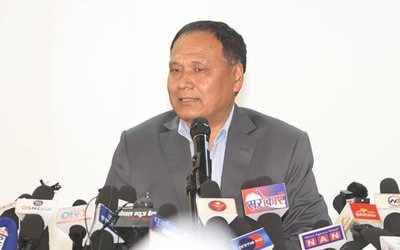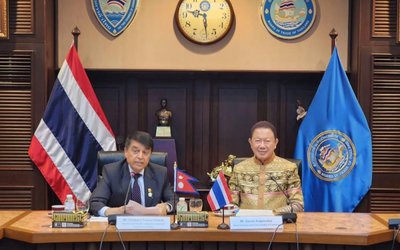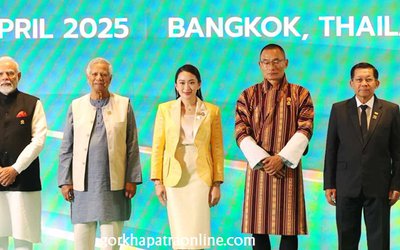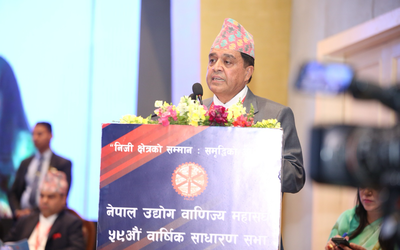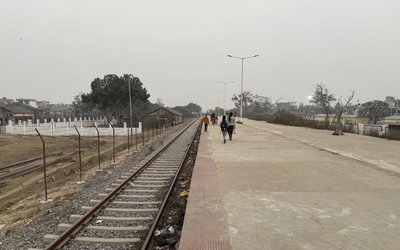
Following the announcement of the implementation of the Millennium Challenge Corporation (MCC)-supported Compact in Nepal, the country has avoided a major crisis in transmitting electricity from its generation center to the distribution center outlined in the plan.
As a component of the MCC, the government of the United States will grant Nepal $400 million for the construction of a strategically significant transmission line and the enhancement of a segment of the East-West Highway.
Under the MCC Grant, MCA-Nepal will construct 315 kilometers of double circuit 400kV transmission lines and three additional substations. In addition, the 77-kilometer segment of the East-West Highway in Dang will be upgraded using new technology.
Although the Millennium Challenge Corporation (MCC) provided more than $400 million in grant funding to build a 315-kilometer 400 kV transmission line and a road section, the implementation of the MCA-Nepal project took nearly seven years due to political pressures from both extreme left and right-wing groups, as well as the visible and hidden influence of Nepal's neighboring countries.
After the World Bank withdrew from the Arun III hydroelectric project in 1995 and the US-supported education policy in 1970, the MCC-Nepal project became the first to enter into regional geopolitics.
The ratification and implementation stages of MCC-Nepal have faced challenges due to Nepal's unstable political situation and geopolitical complexities. The future of MCC-Nepal may prove to be a difficult path.
However, on August 30, the Nepalese government and the Millennium Challenge Corporation (MCC) commenced the official implementation of the MCC Nepal Compact. The program is jointly financed by the Nepalese government and the MCC, representing a noteworthy accomplishment. This achievement follows an agreement between Nepal and the MCC on the substantial progress made during project preparation.
Finance Minister Dr. Prakash Sharan Mahat and MCC Vice President for Compact Operations Cameron Alford exchanged the Nepal Compact Entry into Force (EIF) Letter in the presence of key stakeholders at a meeting held at the Ministry of Finance.

The EIF marks an important milestone for MCC compacts, signifying the completion of necessary requirements and preparations needed to ensure the successful conclusion of compact projects within the next five years.
"We are pleased to celebrate the milestone achievement of implementing the Electricity Transmission Project and the Road Maintenance Project, both of which will invest in Nepal's strategic road network," Dr. Mahat stated on the occasion. He expressed his conviction that the MCC Nepal Compact, with its projects supporting Nepal's growth, will benefit the people of Nepal by providing them with improved road infrastructure and reliable electricity."
“This is an exciting moment for the MCC-Nepal partnership,” MCC VP Alford said. “MCC is proud to work alongside our Nepali partners to invest in Nepal’s greatest asset, its people. Together, we will advance economic growth by creating business opportunities for Nepalis, improving road maintenance on the strategic road network, and finding innovative ways to improve the reliability of electricity all while protecting the environment.”
Khadga Bahadur Bisht, Executive Director at MCA-Nepal, highlighted the implementing entity of the program. “We are looking forward to complete the projects successfully within the set budget and time frame as per the direction from the Government of Nepal and with MCC's cooperation,” said Bisht.
The Nepal Government and MCC signed the MCC Nepal Compact on September 14, 2017 for two projects: the Electricity Transmission Project and the Road Maintenance Project. These projects aim to increase electricity reliability and decrease transportation costs in Nepal.
The program is co-funded by the US Government's Millennium Challenge Corporation (MCC) Compact grant of $500 million and the Nepal government’s contribution of $197 million.
In a nation where problematic projects with persistent delays and budget overruns have overshadowed infrastructure development, a $697 million mega infrastructure project (equivalent to over $92 billion at the current exchange rate) began on Wednesday, August 30th, with a five-year timeline for completion.
It is noteworthy that every political party and all former prime ministers - Sher Bahadur Deuba, KP Sharma Oli, Pushpa Kamal Dahal Prachanda (who currently holds the position of PM), Sushil Koirala, and Dr. Baburam Bhattarai, as well as the Chairman of the Council of Ministers during the caretaker government in 2013 - have advanced the agreement since the nation was chosen for the Nepal Threshold Program of the MCC in 2011.
Prepared through a 12-year-long process, the successful implementation of MCA-Nepal is crucial in demonstrating to the global community that Nepal is an investment-friendly destination for building infrastructure.
- NEPAL-THAILAND: Joint Business Council
- Apr 13, 2025
- BIMSTEC SUMMIT: Nepal’s Stand
- Apr 11, 2025
- IME GROUP: Expands Into Paper Industry
- Mar 24, 2025
- CPN UML: Instigated By India
- Mar 23, 2025
- ADB’S CHIEF ECONOMIST: Nepal Reduces Poverty
- Mar 11, 2025


